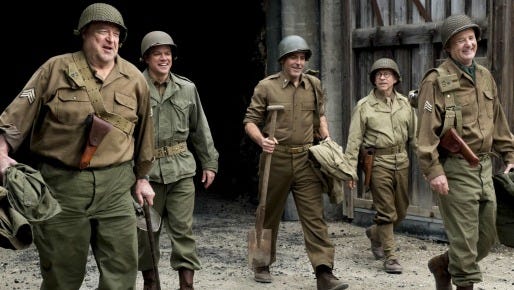The Monuments Men

"The Monuments Men" was expected to be a major contender in the Oscar race but got pulled at the last minute from its December 2013 release and moved into February. That rarely speaks well for a movie's quality, so it's no surprise that the latest from director/co-writer/star George Clooney is a disappointment.
It's not a bad movie, certainly, and isolated sections are quite enjoyable in a breezy, been-there-done-that sort of way. It's a World War II story that owes a lot of plot points to other war pictures and also copies their look and tone. Because it stars all middle-aged actors, with the average somewhere in the early 50s, one could dismiss it as "Saving Private Ryan with Geezers."
(Indeed, Matt Damon, a whippersnapper when he played the title role in "Ryan," is now the youngest guy on the team.)
The concept is certainly a departure from the norm. Instead of the usual dogfaces-in-their-trenches action or generals agonizing over war plans and lost lives, this is the story of the Monuments, Fine Arts and Archives program, an Allied effort to preserve antiquities being stolen or destroyed by the Nazi machine.
They saved millions of pieces of art, and it's an engaging, relatively unknown subject that received the spotlight in a book by Robert M. Edsel and Bret Witter, adapted for the screen by Clooney and longtime collaborator Grant Heslov.
Of course, liberties have to be taken to translate such a grand undertaking for a movie, and the film does so liberally. The primary conceit is presenting the Monuments Men as a tiny group of art experts who trade in their magnifying glasses for rifles when, in reality, more than 400 soldiers and civilians were involved.
This automatically brings up similarities with other WWII movies like "The Dirty Dozen," where a ragtag team of castoffs are thrown together and given a big, seemingly impossible mission. The film also has similarities to crime caper flicks because our guys are essentially trying to steal the art before Hitler does (though with the intention of giving it back to the original owners).
As a result of this and some of the casting choices, "The Monuments Men" has a curiously comedic vibe. Bill Murray plays Campbell, the resident architect and droll quip-man. Bob Balaban is Savitz, the chief target of his jokes and an intemperate little man who resents being looked down upon. John Goodman is Garfield, much too old and large for Army gear, and Jean Dujardin is Clermont, the obligatory French guy.
Damon plays Granger, an art expert who gets sent ahead to be the advance man as the Germans retreat, and Hugh Bonneville is Jeffries, a stiff-upper-lip British type looking to redeem himself after past failures. Clooney is Stokes, who came up with the idea for the Monuments Men and acts as leader.
Dimitri Leonidas is the add-on as Epstein, a Jewish-German emigre who gets conscripted because he speaks the lingo. Cate Blanchett turns up as a bookish French art expert who worked for the Nazis and has to be convinced by Granger to give up her secrets.
The biggest problem with the movie is inconsistency. Some sections sing while others feel flat and by-the-numbers. For instance, the conflict between the Damon and Blanchett characters that eventually turns to feelings of ardor seems preordained.
Clooney & Co. go for a certain amount of gravitas in certain sections, but that's undercut by all the humor. For instance, after operating as the comic relief for the entire movie, Murray suddenly gets a dramatic scene with a message from home; the whole thing feels forced and false. There's another scene where Garfield and Savitz share a tense moment with a young German soldier that seems to come out of nowhere and recede just as quickly.
They're not helped by a bombastic score by the usually reliable Alexandre Desplat ("The King's Speech"), who appears to have come up with the music by copying passages from other WWII movies. Good film music should add to the atmosphere rather than try to substitute for it; Desplat's score pushes the audience around.
The lack of a compelling villain also hurts. We get a succession of German officers who appear and then disappear as the chief baddie; Clooney gets a big face-off scene with a smirky SS officer but the moment carries little real weight because we've only seem him once before. Late in the game, the movie also adds a competing Soviet "trophy brigade" snatching up all the art for Mother Russia, but all they seem to do is ride around in vehicles — more existential threat than antagonists.
"The Monuments Men" is something of a puzzle. It has all the pedigree of a good or even great film but falls flat. I'm reminded of "American Gangster," another movie loaded with talent that just couldn't seem to come together.
As a filmmaker, Clooney has usually been ol' reliable, lighting up everything he touches. Despite being a movie about the preciousness of artistry, the magic is missing here.
3.5 Yaps



